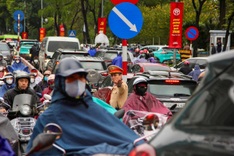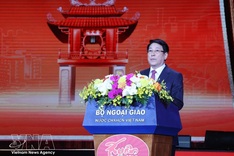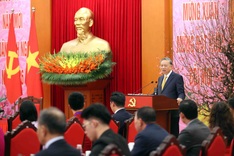Numerous low-income tenants in major cities are being forced to pay over the top for their electricity by unscrupulous landlords.
| Students are often overcharged for electricity |
Even though Government Decree 68 stipulates that landlords would be fined for charging tenants too much for the power they use, it has yet to be enforced.
Making life tougher, power price was hiked by 15.28 per cent on March 1.
Nguyen Thuy Linh, a third-year student at Viet Nam National University in Ha Noi, who rents a 10sq m room with her older sister, said they had to pay VND4,000 (USD0.18) per kWh after Tet, VND1,000 higher than before. She also said her landlord had raised the rent.
"When I first came to Hanoi three years ago, it [electricity] cost VND1,500 (USD0.07) per kWh, which was also considered to be high at the time," Linh said.
Paying VND4,000 ($0.18) per kWh is still less than Linh\'s friend has to pay. Dang Duy Tung, a student at Ha Noi National University of Economics, has to fork out VND5,000 (USD0.23) per kWh – four times higher than the average electricity price of VND1,242 (USD0.056) set by the Government.
"It\'s difficult for a student to manage on a limited budget with such high electricity costs. However, it\'s even more difficult to find an affordable room for us to live in Ha Noi now," Tung said.
To save electricity, Tung often goes to the university\'s library to study in the evening and manages to consume just 15 kWh per month.
Linh\'s landlord said the price hike was in line with the Government\'s new pricing policy.
When the tenants complained about the unreasonably high cost of electricity, her landlord refused to listen.
Meanwhile, Nguyen Thi Lac, from northern Nam Dinh Province, works in Hanoi as a street vendor. She said: "The electricity price is high, about VND3,500 (USD0.16) per kWh."
A number of tenants when approached by the Vietnam News said they would be kicked out by their landlords if they refused to pay more for their electricity.
According to the Ministry of Construction statistics, about 7 million people are homeless in Vietnam.
Nguyen Thi Nhu Quynh, a student at Da Nang University of Science and Technology, chose to live in the university\'s dormitory, which is cheaper than private accommodation. She pays VND1,500 (USD0.07) per kWh.
Tran Manh Tuan, an official from Cau Giay District\'s Electricity Department who is in charge of checking monthly power consumption among local households, said it was difficult to prevent tenants being overcharged by landlords.
Tuan said most landlords registered to buy power for personal consumption but were in fact using it for commercial purposes.
Under Government Decree 68, issued in June 2010, if caught they faced a fine of up to VND4 million (USD190).
"The fine is not severe enough to prevent landlords from increasing the electricity price paid by residents," Tuan said.
He also said it was hard to prove that landlords were breaking the law.
The deputy head of the Electricity Department under the Ha Noi Department of Industry and Trade, Nguyen Dinh Thang, said his agency was aware that some tenants were being overcharged for the electricity they used but had yet to do anything about it.
In addition, tenants often changed their accommodation, making it difficult to monitor the situation, Thang said.
"The tenants should not accept the price hike," he added.




















